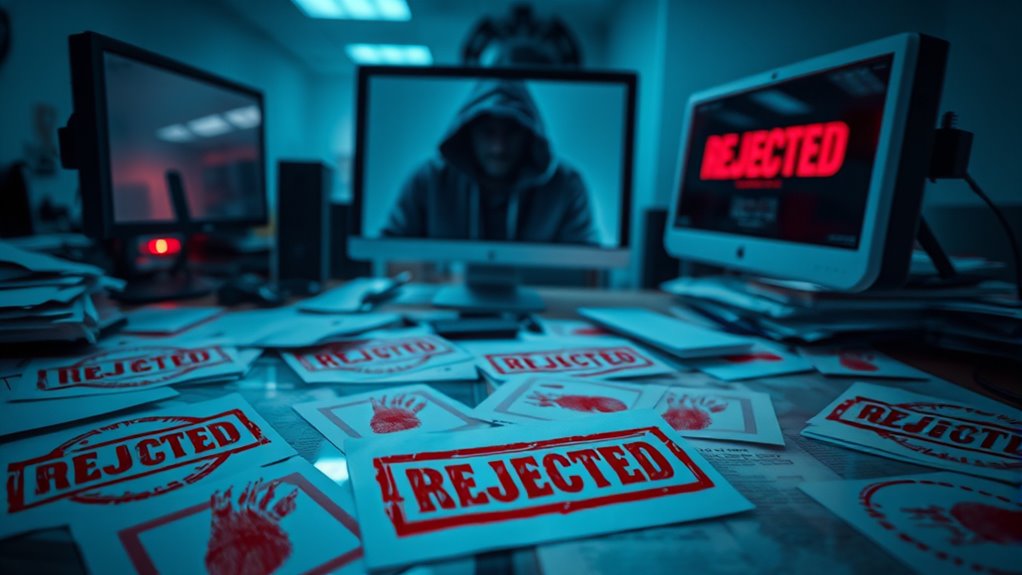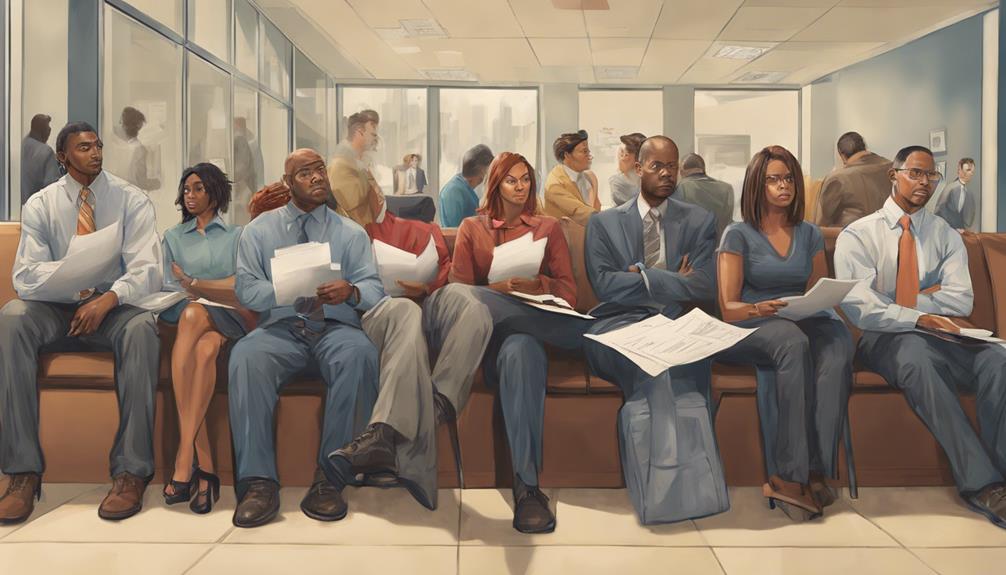If you encounter serious crimes like violent offenses or armed robbery, you should flag these immediately, as they pose safety risks. Unresolved arrests or ongoing drug issues are red flags that indicate potential trouble. Dishonesty, such as hiding criminal history or providing inconsistent information, also signals a lack of integrity. Recognizing these warning signs helps you make better screening decisions—keep going to find out more about these critical red flags.
Key Takeaways
- Presence of serious criminal offenses like violent crimes or armed robbery.
- Multiple arrests without convictions or unresolved charges.
- History of drug abuse or possession indicating ongoing issues.
- Dishonesty or concealment of criminal history on the application.
- Discrepancies or inconsistencies between applicant’s story and criminal records.

When conducting a criminal background check, certain red flags can immediately disqualify a candidate, regardless of other qualifications. Recognizing these red flags helps you avoid background check pitfalls that could lead to bad hiring decisions. One of the most common mistakes is falling for criminal record myths that can skew your judgment. For example, some believe that a minor offense automatically disqualifies someone, but in reality, context and recency matter more. Understanding what truly constitutes a red flag prevents you from dismissing potentially valuable candidates based on misconceptions.
The first red flag you should watch for is a pattern of violent crimes or serious felonies. These offenses—such as assault, armed robbery, or sexual assault—pose significant risks to your organization and are typically non-negotiable disqualifiers. Even if the candidate claims they’ve changed, these patterns tend to be consistent, and ignoring such red flags can be dangerous. A criminal record myth often seen here is that past mistakes are always forgivable; however, the severity and frequency of past offenses weigh heavily in your decision. Additionally, understanding the importance of recency and severity in criminal records helps ensure fair and accurate evaluations.
Another red flag is repeated arrests without convictions. While arrests alone shouldn’t be the sole reason to dismiss someone, multiple unresolved or dismissed charges might suggest ongoing issues, especially if they’re recent. Be cautious about relying on assumptions or misconceptions—some believe arrests are always indicative of guilt, but in many cases, they might reflect wrongful accusations or legal technicalities. Understanding this helps you avoid background check pitfalls that lead to unfair discrimination.
A history of drug abuse or possession is another red flag. Even if the candidate has completed rehabilitation, recent or ongoing issues could jeopardize safety or productivity. Don’t fall prey to the myth that all drug-related offenses are minor; many are serious and indicate a pattern of behavior that conflicts with workplace standards. Likewise, dishonesty on application forms or during interviews about past criminal activity should be a red flag. Concealing or falsifying information can signal a lack of integrity, and ignoring this red flag can undermine your trust within your team.
Lastly, a lack of transparency or inconsistent information during the background check process is a critical red flag. If a candidate’s story doesn’t align with the records, it’s a sign they might be hiding something. Remember, while background check pitfalls can tempt you into assumptions, it’s essential to verify facts thoroughly and avoid relying on myths or stereotypes. Recognizing these red flags ensures you make informed, fair, and safe hiring decisions.
Frequently Asked Questions
How Often Do Criminal Screens Lead to False Positives?
Criminal screens can sometimes produce false positives, though the false positive rates vary depending on the screening method used. You might wonder how often this occurs; generally, screening accuracy is high, but no system is flawless. False positives happen when innocent individuals are mistakenly flagged, which can lead to unnecessary delays or concerns. Understanding the false positive rates helps you evaluate the reliability of a criminal screening process and ensures fair assessments.
Can a Criminal Record Be Expunged After Screening?
You might wonder if your criminal record can be expunged after a screening. It depends on your expungement eligibility and the record sealing processes in your state. If you’re eligible, you can petition the court to have your record sealed or expunged, which removes it from public view and can improve your chances for employment. Make sure to review local laws and consult legal guidance to navigate the process effectively.
Are There Legal Ways to Challenge a Criminal Screen Result?
Imagine your criminal screen results as a locked door. Legal challenges act as keys you can use to open it, questioning the fairness or accuracy of screening procedures. You can challenge the result if there’s evidence of errors, outdated info, or if procedures weren’t followed properly. By filing appeals or requesting a review, you’re fundamentally turning the key, giving yourself a fair shot at correcting the record and opening new possibilities.
Do Different Industries Have Varying Red Flags in Screenings?
Different industries do have varying red flags in screenings due to industry-specific concerns and regulations. For example, healthcare may focus on criminal history related to patient safety, while finance emphasizes credit and fraud risks. Screening variations depend on the industry’s unique security needs and legal standards. You should understand these differences to guarantee your background check aligns with specific industry requirements, avoiding potential red flags that could unfairly disqualify you.
How Can I Improve My Chances if I Have Red Flags?
To improve your chances during background checks and maintain your employment eligibility, be honest about any red flags on your record. Explain the circumstances clearly and demonstrate how you’ve changed or learned from past mistakes. Providing references or proof of rehabilitation can also help. Remember, transparency shows responsibility, and employers appreciate honesty, which can help mitigate concerns and improve your overall impression during the screening process.
Conclusion
So, now you know the seven red flags that can instantly tank a criminal screen. Spot any of these warning signs, and you might as well be waving a neon sign screaming “fail!” Remember, missing even one detail could be the difference between passing with flying colors or crashing and burning like a rocket gone astray. Stay vigilant, double-check everything, and don’t let overlooked red flags turn your chances into a total disaster.









